Unit 2 Neighbours grammar课件28张
文档属性
| 名称 | Unit 2 Neighbours grammar课件28张 |  | |
| 格式 | zip | ||
| 文件大小 | 491.6KB | ||
| 资源类型 | 教案 | ||
| 版本资源 | 牛津译林版 | ||
| 科目 | 英语 | ||
| 更新时间 | 2022-01-19 12:19:45 | ||
图片预览

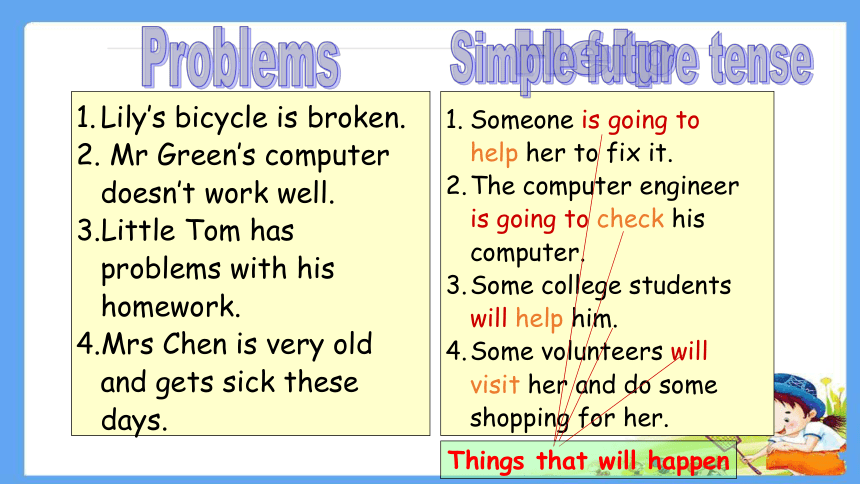
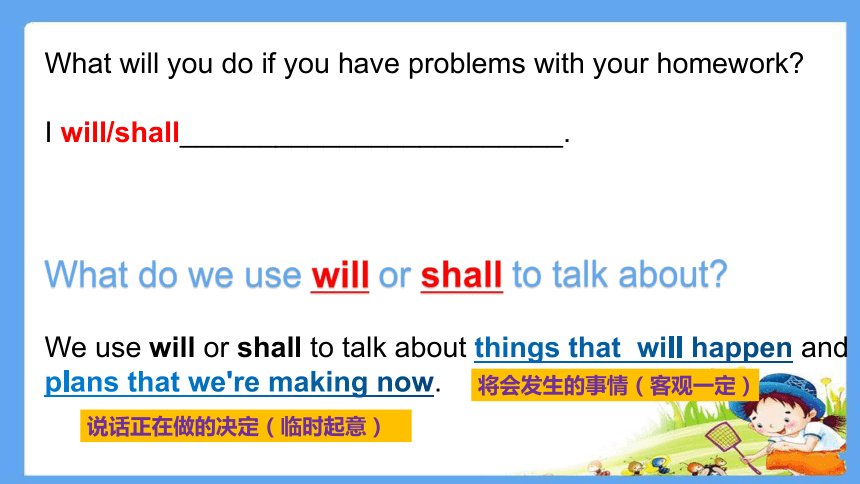
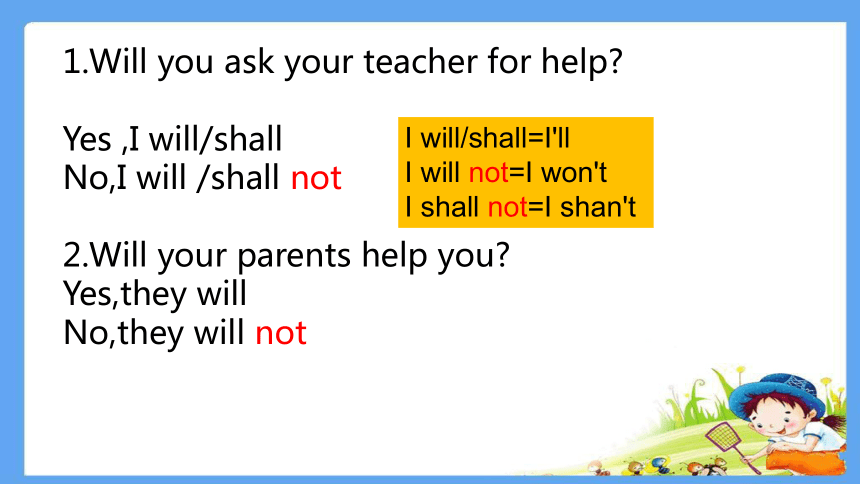
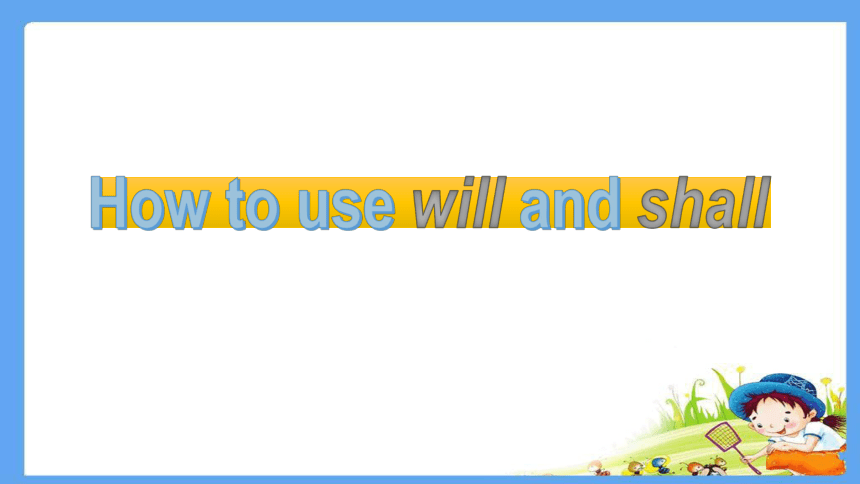


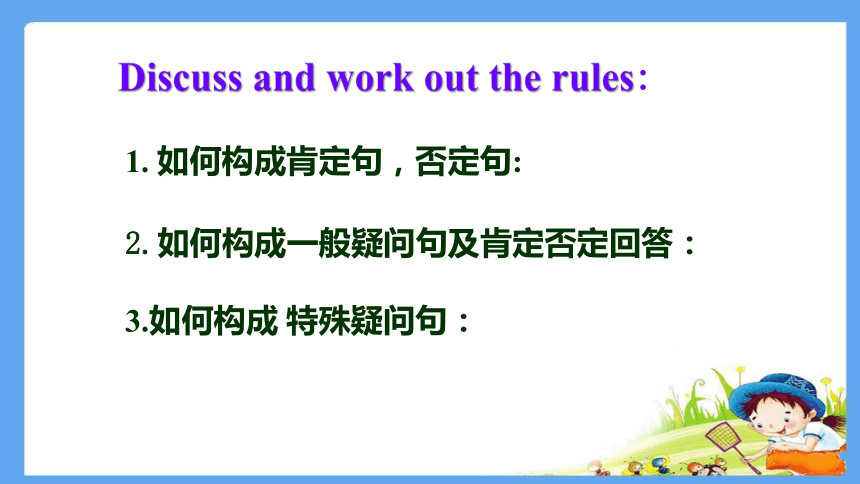
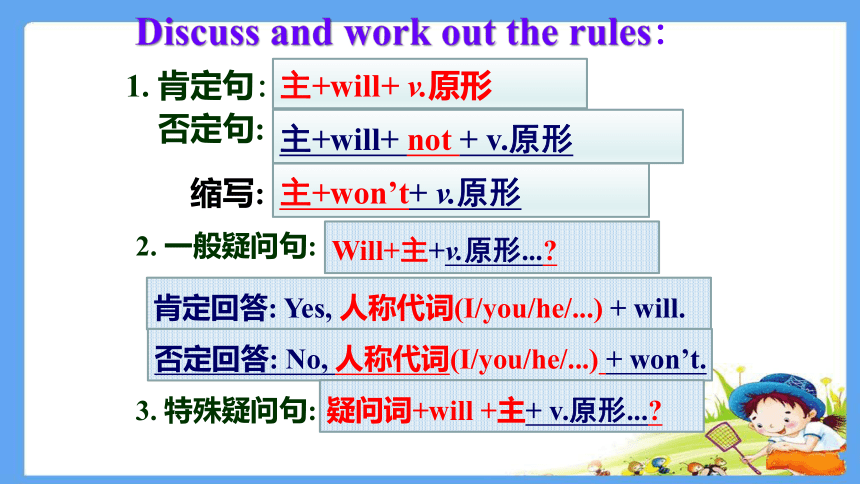
文档简介
(共28张PPT)
Unit2 Neighbours
Grammar
Lily’s bicycle is broken.
Mr Green’s computer doesn’t work well.
Little Tom has problems with his homework.
Mrs Chen is very old and gets sick these days.
Someone is going to help her to fix it.
The computer engineer is going to check his computer.
Some college students will help him.
Some volunteers will visit her and do some shopping for her.
Problems
Help
Simple future tense
Things that will happen
What will you do if you have problems with your homework
I will/shall________________________.
What do we use will or shall to talk about
We use will or shall to talk about things that will happen and plans that we're making now.
将会发生的事情(客观一定)
说话正在做的决定(临时起意)
1.Will you ask your teacher for help
Yes ,I will/shall
No,I will /shall not
2.Will your parents help you
Yes,they will
No,they will not
I will/shall=I'll
I will not=I won't
I shall not=I shan't
How to use will and shall
I/we go.
you/they/he/she/it
We make positive and negative forms like this:
I/We go.
You/They/He/She/It
Yes, I/we
you/they he/she/it
No, I/we
you/they he/she/it
will/shall
will
will not/
shall not
will not
will (not)/shall (not)
will (not)
We ask and answer questions like this:
Will/Shall
Will
I
YouHe
She
It
We
They.
will / won’t go to the park.
shall / shan’t go to the park.
A. Simple future tense with will
and shall
will (可以用于任何人称)
shall (主语是I / we 时用)
Discuss and work out the rules:
1. 如何构成肯定句,否定句:
2.如何构成一般疑问句及肯定否定回答:
3.如何构成 特殊疑问句:
Discuss and work out the rules:
1. 肯定句:
否定句:
缩写:
主+will+ v.原形
主+will+ not + v.原形
主+won’t+ v.原形
2. 一般疑问句:
肯定回答: Yes, 人称代词(I/you/he/...) + will.
否定回答: No, 人称代词(I/you/he/...) + won’t.
Will+主+v.原形...
3. 特殊疑问句:
疑问词+will +主+ v.原形...
Simon's computer is broken.He is asking someone at the community centrefor plete their conversation with the simple future tense of the verbs inbrackets.
Asking for help
Mr Lin: Hello, Simon. Do you need any help
Simon: Yes, Mr Lin. There’s something
wrong with my computer.
Mr Lin: OK. We __________ (ask) an engineer
to check it for you.
Simon: When _____ the engineer _____ (be) free
Mr Lin: Well, we _________ (call) him first.
______ you ________ (wait) for us to
call back
Simon: All right. I ___________ (wait) for your
call. Thanks.
Mr Lin: You’re welcome.
will ask
will call
will
Will
wait
will wait
be
1.The community centre in my neighbourhood
is going to have a "helping hands" meeting the day after tomorrow.
2.I'm going to teach children English songs.
3. My daughter is going to dance for the old people.
4.My parents are going to cook some delicious food.
How to use be going to
We ask and answer questions like this:
I going to have a party
tomorrow
you/we/they
she/he/it
Yes, I
you/we/they
he/she/it
No, I
you/we/they
he/she/it
Am
Are
Is
am
are
is
am not
are not
is not
1. I am going to visit my uncle next weekend.
1.something we decide to do
表示打算将要做的事情 “预谋已久”
B. Simple future tense with be going to
2. She is going to watch a film this Sunday.
2. things that will probably happen
表示很有可能即将发生的事情 “主观判断很有可能”
1)It is so cloudy(多云的). I think it is going to rain.
2) It is7:50. They are going to be late for work.
Discuss and work out the rules:
1. 如何构成肯定句,否定句:
2.如何构成一般疑问句及肯定否定回答:
3.如何构成 特殊疑问句:
1. 肯定句:
2.否定句:
He is going to play football.
He is not/isn’t going to play football.
Discuss and work out the rules:
主+be going to + v.原形
主+be + not + going to + v.原形
3.一般疑问句:
Is he going to play football
4. 一般疑问句回答:
Yes, he is.
No, he isn’t.
Be+主+going to+v.原形
肯定: Yes, 人称代词(I/you/he/...) + be.
否定: No, 人称代词(I/you/he/...) + be + not.
Match
I
You
He
She
It
We
They
am going to
are going to
is going to
I(am)、
he,she,it(is)
you,they,we(are)
Simon is telling Amy about his plan for a day out with his uncle's family.Help him use the correct forms of be going to to talk about his plan.
Plan a day out
are
going to do
am going to buy
is going to buy
are
going to do
are going to bring
is going to make
is
going to do
is going to cook
Discussion:
Will/shall & be going to
Are they the same or different
The same. 如:我打算买可乐。既可以说I will buy cola.又可以说I am going to buy cola.
Different. 如:我明年11岁。只能说I will be 11 years old.
Your opinion(观点)
都可以表示将要发生的事,将要去做某事,两者有时可以互换;
Will/shall & be going to
但有时有区别:
will 客观上势必发生 It will be the year of dog.(明年是狗年.) 临时起意
He will go walking on the playground.
be going to 主观上判断很有可能发生 The car is broken. We are going to be late. 预谋已久
We are going to have an exam next week.
Will vs Be going to
future plans
(decided at the moment)
future plans
(decided in the past)
will
be going to
predictions
(evidence )
predictions
(personal opinions)
something is sure to happen
something is probably to happen
将会发生的事情(客观势必)
说话正在做的决定(临时起意)
主观判断 有可能即将发生
蓄谋已久
Summary
will
/shall
be
going to
Simple future tense
things that
are sure to happen in the future
plans that we are making now
something we decide to do
things that will
probably happen
Future
time expressions
next …; tomorrow
tonight;
in a few days …
在时态填空考试时
一般情况下所有人称只要用: will + 动词原形
五、用法区别:will / shall / be going to
注意点:
① 当主语是I / we 时,以下句子习惯
用 shall we / shall I:
1. Where ______ we meet tomorrow
2. What time _______ we leave tomorrow morning
3. When ________ I meet you tomorrow night
shall
shall
shall
② 当主语是I / we 时,征求别人的意见或者建议时,
只能用:Shall I ….. // Shall we….
表示 我做某事,好吗?
我们做某事,好吗?
1. _________open the windows now
2. __________play football this afternoon
3. Let’s play football this afternoon, __________
Shall I
Shall we
shall we
⑤ 有关“下雨”的3种情况:
1. 天空乌云密布,马上要下雨:
只能用
It’s cloudy today. It ______________________ (rain) soon.
There’s much cloud in the sky. I think it________(rain) soon.
2. 希望明天不下雨; 不知道明天是否下雨,天气预报有雨。
只能用_________
I hope it _______________(not rain) tomorrow.
I don’t know if/whether it ________(rain) tomorrow.
3. if 条件从句中;
如果明天下雨:只能用一般现在时
We won’t visit the museum if it __________(rain)
tomorrow. (如果明天下雨,我们就不去参观博物馆了)
be going to
will / won’t
is going to rain
is going to rain
won’t rain
will rain
rains
⑥ There be 句型的将来时表达:
1.There _______________________(be)…
2.There _______________________(be)…
3.There _______________________(be)…
⑦ want / need 没有一般将来时,will want×
只有一般现在时 want / wants
和 一般过去时 wanted
He _________to be a doctor when he grows up.
will be
is going to be
are going to be
wants
⑧ 情态动词的将来时
1. can = be able to 能
将能: will be able to
不能用: will can
2. must = have to 必须,不得不
将得: will have to
不能用:will must
√
×
√
×
Unit2 Neighbours
Grammar
Lily’s bicycle is broken.
Mr Green’s computer doesn’t work well.
Little Tom has problems with his homework.
Mrs Chen is very old and gets sick these days.
Someone is going to help her to fix it.
The computer engineer is going to check his computer.
Some college students will help him.
Some volunteers will visit her and do some shopping for her.
Problems
Help
Simple future tense
Things that will happen
What will you do if you have problems with your homework
I will/shall________________________.
What do we use will or shall to talk about
We use will or shall to talk about things that will happen and plans that we're making now.
将会发生的事情(客观一定)
说话正在做的决定(临时起意)
1.Will you ask your teacher for help
Yes ,I will/shall
No,I will /shall not
2.Will your parents help you
Yes,they will
No,they will not
I will/shall=I'll
I will not=I won't
I shall not=I shan't
How to use will and shall
I/we go.
you/they/he/she/it
We make positive and negative forms like this:
I/We go.
You/They/He/She/It
Yes, I/we
you/they he/she/it
No, I/we
you/they he/she/it
will/shall
will
will not/
shall not
will not
will (not)/shall (not)
will (not)
We ask and answer questions like this:
Will/Shall
Will
I
YouHe
She
It
We
They.
will / won’t go to the park.
shall / shan’t go to the park.
A. Simple future tense with will
and shall
will (可以用于任何人称)
shall (主语是I / we 时用)
Discuss and work out the rules:
1. 如何构成肯定句,否定句:
2.如何构成一般疑问句及肯定否定回答:
3.如何构成 特殊疑问句:
Discuss and work out the rules:
1. 肯定句:
否定句:
缩写:
主+will+ v.原形
主+will+ not + v.原形
主+won’t+ v.原形
2. 一般疑问句:
肯定回答: Yes, 人称代词(I/you/he/...) + will.
否定回答: No, 人称代词(I/you/he/...) + won’t.
Will+主+v.原形...
3. 特殊疑问句:
疑问词+will +主+ v.原形...
Simon's computer is broken.He is asking someone at the community centrefor plete their conversation with the simple future tense of the verbs inbrackets.
Asking for help
Mr Lin: Hello, Simon. Do you need any help
Simon: Yes, Mr Lin. There’s something
wrong with my computer.
Mr Lin: OK. We __________ (ask) an engineer
to check it for you.
Simon: When _____ the engineer _____ (be) free
Mr Lin: Well, we _________ (call) him first.
______ you ________ (wait) for us to
call back
Simon: All right. I ___________ (wait) for your
call. Thanks.
Mr Lin: You’re welcome.
will ask
will call
will
Will
wait
will wait
be
1.The community centre in my neighbourhood
is going to have a "helping hands" meeting the day after tomorrow.
2.I'm going to teach children English songs.
3. My daughter is going to dance for the old people.
4.My parents are going to cook some delicious food.
How to use be going to
We ask and answer questions like this:
I going to have a party
tomorrow
you/we/they
she/he/it
Yes, I
you/we/they
he/she/it
No, I
you/we/they
he/she/it
Am
Are
Is
am
are
is
am not
are not
is not
1. I am going to visit my uncle next weekend.
1.something we decide to do
表示打算将要做的事情 “预谋已久”
B. Simple future tense with be going to
2. She is going to watch a film this Sunday.
2. things that will probably happen
表示很有可能即将发生的事情 “主观判断很有可能”
1)It is so cloudy(多云的). I think it is going to rain.
2) It is7:50. They are going to be late for work.
Discuss and work out the rules:
1. 如何构成肯定句,否定句:
2.如何构成一般疑问句及肯定否定回答:
3.如何构成 特殊疑问句:
1. 肯定句:
2.否定句:
He is going to play football.
He is not/isn’t going to play football.
Discuss and work out the rules:
主+be going to + v.原形
主+be + not + going to + v.原形
3.一般疑问句:
Is he going to play football
4. 一般疑问句回答:
Yes, he is.
No, he isn’t.
Be+主+going to+v.原形
肯定: Yes, 人称代词(I/you/he/...) + be.
否定: No, 人称代词(I/you/he/...) + be + not.
Match
I
You
He
She
It
We
They
am going to
are going to
is going to
I(am)、
he,she,it(is)
you,they,we(are)
Simon is telling Amy about his plan for a day out with his uncle's family.Help him use the correct forms of be going to to talk about his plan.
Plan a day out
are
going to do
am going to buy
is going to buy
are
going to do
are going to bring
is going to make
is
going to do
is going to cook
Discussion:
Will/shall & be going to
Are they the same or different
The same. 如:我打算买可乐。既可以说I will buy cola.又可以说I am going to buy cola.
Different. 如:我明年11岁。只能说I will be 11 years old.
Your opinion(观点)
都可以表示将要发生的事,将要去做某事,两者有时可以互换;
Will/shall & be going to
但有时有区别:
will 客观上势必发生 It will be the year of dog.(明年是狗年.) 临时起意
He will go walking on the playground.
be going to 主观上判断很有可能发生 The car is broken. We are going to be late. 预谋已久
We are going to have an exam next week.
Will vs Be going to
future plans
(decided at the moment)
future plans
(decided in the past)
will
be going to
predictions
(evidence )
predictions
(personal opinions)
something is sure to happen
something is probably to happen
将会发生的事情(客观势必)
说话正在做的决定(临时起意)
主观判断 有可能即将发生
蓄谋已久
Summary
will
/shall
be
going to
Simple future tense
things that
are sure to happen in the future
plans that we are making now
something we decide to do
things that will
probably happen
Future
time expressions
next …; tomorrow
tonight;
in a few days …
在时态填空考试时
一般情况下所有人称只要用: will + 动词原形
五、用法区别:will / shall / be going to
注意点:
① 当主语是I / we 时,以下句子习惯
用 shall we / shall I:
1. Where ______ we meet tomorrow
2. What time _______ we leave tomorrow morning
3. When ________ I meet you tomorrow night
shall
shall
shall
② 当主语是I / we 时,征求别人的意见或者建议时,
只能用:Shall I ….. // Shall we….
表示 我做某事,好吗?
我们做某事,好吗?
1. _________open the windows now
2. __________play football this afternoon
3. Let’s play football this afternoon, __________
Shall I
Shall we
shall we
⑤ 有关“下雨”的3种情况:
1. 天空乌云密布,马上要下雨:
只能用
It’s cloudy today. It ______________________ (rain) soon.
There’s much cloud in the sky. I think it________(rain) soon.
2. 希望明天不下雨; 不知道明天是否下雨,天气预报有雨。
只能用_________
I hope it _______________(not rain) tomorrow.
I don’t know if/whether it ________(rain) tomorrow.
3. if 条件从句中;
如果明天下雨:只能用一般现在时
We won’t visit the museum if it __________(rain)
tomorrow. (如果明天下雨,我们就不去参观博物馆了)
be going to
will / won’t
is going to rain
is going to rain
won’t rain
will rain
rains
⑥ There be 句型的将来时表达:
1.There _______________________(be)…
2.There _______________________(be)…
3.There _______________________(be)…
⑦ want / need 没有一般将来时,will want×
只有一般现在时 want / wants
和 一般过去时 wanted
He _________to be a doctor when he grows up.
will be
is going to be
are going to be
wants
⑧ 情态动词的将来时
1. can = be able to 能
将能: will be able to
不能用: will can
2. must = have to 必须,不得不
将得: will have to
不能用:will must
√
×
√
×
